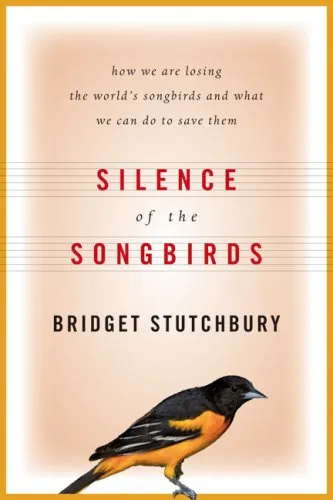Silence of the Songbirds: How We are Losing the World's Songbirds and What We Can Do to Save Them
By (author): "Bridget Joan Stutchbury"
ISBN0002007282
ISBN139780002007283
AsinSilence of the Songbirds: How We are Losing the World's Songbirds and What We Can Do to Save Them
Original titleSilence of the Songbirds: How We Are Losing the World's Songbirds and What We Can Do to Save Them
Wood Thrush, Kentucky Warbler, Eastern Kingbirdmigratory songbirds are disappearing at a frightening rate. By some estimates, we may already have lost almost half the songbirds that filled the skies only 40 years ago. Bridget Stutchbury, in a narrative as colourful as the creatures she studies, demonstrates why this decline should concern us all. The expert ornithologist and naturalist convincingly argues that songbirds truly are the canaries in the coal mineexcept the coal mine looks a lot like Earth and we are the hapless excavators. Following the birds on their 10,000-kilometre migratory journey, Stutchbury looks at the most threatening factors: pesticides, still a major concern decades after Rachel Carson first raised the alarm; the destruction of vital habitat, from the boreal forests of Canada to the tropical jungles of Brazil to the vast grasslands of Argentina; coffee plantations, which push birds out of their forest refuges so we can have our morning fix; the bright lights and structures in our cities, which prove a minefield for migrating birds; the notorious cowbirds that force songbirds to act as surrogate mothers to their own voracious young; and global warming. We may well wake up in the near future and hear no songbirds singing. We won t only be missing their cheery calls, we ll be missing a vital part of our ecosystem. Without songbirds, our forests face insect infestations, and our trees, flowers and gardens lose a crucial element in their reproductive cycle. What does this very real threat mean for our ecosystem, and ultimately, us?A perfect full moon rose in the east as I paddled back to shore before it got dark, the martins safely tucked in for the night. Big storms had been brewing over land since late afternoon, and . . . a distant lightning bolt lit up the bottom of the clouds briefly. I was tired and heading home at day s end, but as I paddled against a headwind, I thought about the hundreds of thousands of songbirds that must be hidden in the forests and fields around me, only minutes away from taking to the sky. One by one, the warblers, tanagers, thrushes and countless others would be in the air and heading southward with uncanny navigation skills, not knowing exactly where they would land, but driven by instinct born of the successful migration of their ancestors. fromSilence of the Songbirds"
